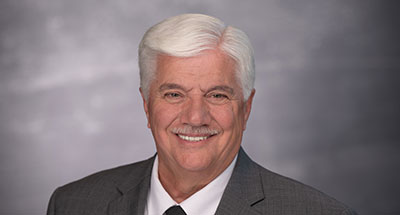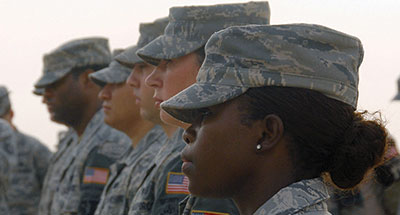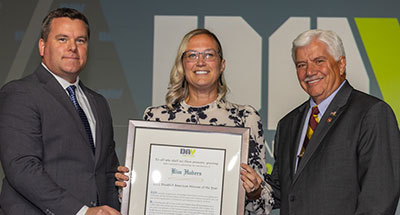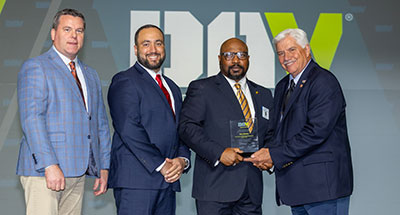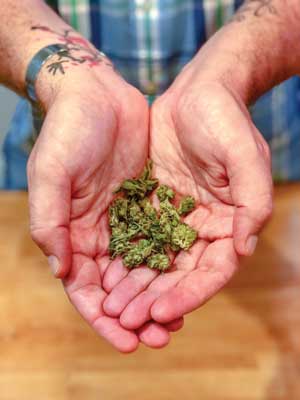

Like many veterans, the rigors of military service took a toll on Air Force veteran Jarid Watson’s body. He’s not sure when exactly it happened—perhaps during physical training or while loading and unloading cargo planes as a member of the world-famous U.S. Air Force Thunderbirds—but at some point during his nearly 12 years in uniform, a bone growth on the ball joint of his hip tore his labrum and damaged much of the surrounding cartilage.
The injury brought on chronic pain for Watson and eventually led to his medical retirement from the military in 2016. It also severely affected his sleep, which in turn negatively influenced his motivation and mood. As a father, husband, entrepreneur and student, he knew something had to be done to combat the pain and restore his ability to get a good night’s rest, for the benefit of himself, his family, his career and his studies.
For Watson, there was only one choice.
“As soon as I knew I was going to be getting out of the military and dealing with this chronic pain for the foreseeable future, the first thing I thought of was ‘I can’t wait to try medical cannabis,’” Watson, a DAV life member of Chapter 33 in Odenton, Md., explained. “I’m not going to take pain pills.”
Watson’s reluctance toward painkillers stems from personal experience. A native of northeast Ohio, the Afghanistan War veteran lost two high school friends to opioid overdoses and has witnessed firsthand how addiction can destroy individuals and their families.
“That area has been devastated with opioid, opiate and heroin use. That’s what’s tearing families apart in this country. It’s killing people,” Watson said.
According to a 2017 report from the National Center for Health Statistics, the national opioid crisis killed more than 42,000 Americans in 2016. Alarmingly, a 2013 analysis by the Center for Investigative Reporting found that opioid prescriptions for veterans spiked 270 percent over a 12-year period, while a 2011 Department of Veterans Affairs study found that veterans were twice as likely as the rest of the population to die from an opioid overdose.
The VA also estimates that 68,000 veterans—about 13 percent of the total population of veterans currently taking opioids—have an opioid-use disorder. Yet doctors continue to prescribe them for chronic pain, a condition which affects 60 percent of veterans from deployments to the Middle East and 50 percent of older veterans, according to VA officials.
“Sixty percent of what the VA treats can fall into the category of chronic pain, and the system was not designed to do much more than push pills, and those pills aren’t working,” said Nick Etten, founder and executive director of Veterans Cannabis Project, a nonprofit organization dedicated to helping military veterans improve their quality of life through access to cannabis for medical purposes.


Etten, a former Navy SEAL and graduate of the U.S. Naval Academy, also noted that medicinal cannabis is an effective treatment for the signature wounds of wars in the Middle East—post-traumatic stress disorder and traumatic brain injury. He cited pain, sleep and anxiety as the major symptoms veterans deal with in relation to their service-connected injuries.
“Cannabis is showing itself to be safe and effective in treating those,” he said. “That’s where it’s transformative and can be a game-changer.”
“Before [Jarid] started using [cannabis], he was constantly complaining about how tense and tight he was and how much his hip hurt,” said Watson’s wife, Priscilla. “The pain would keep him up all night, so not only would he wake up in pain, but he’d wake up fatigued and tired and need naps throughout the day. But now, he sleeps all night and isn’t in pain anymore.”
A nutritional therapist and Air Force veteran herself, Priscilla feels cannabis is a more natural and safer alternative to addressing pain than pharmaceuticals, noting the disparity between what she calls “the antiquated argument that marijuana is dangerous” and the results she’s seen firsthand.
“He’s happier, more productive and more motivated to do things,” she added. “So it has really changed the quality of life, big time.”
The couple points out that the benefits of medical cannabis correlate with its responsible use, which includes abstaining from driving while under the influence and ensuring proper dosage and administration.
“As someone with a nutrition background, I don’t let Jarid smoke it because I don’t like the smoke in the lungs,” she said. “He makes edibles with it, which I think is a lot safer, and I’ve been told you tend to get a little more positive effect.”
While the VA cannot deny veterans benefits due to medical marijuana use, VA providers cannot recommend or prescribe cannabis since the Food and Drug Administration still classifies it as a Schedule I drug. Instead, Watson has to pay out of pocket for an annual physician’s evaluation and a medical cannabis card in Maryland—one of 30 states, as well as the District of Columbia, which has legalized medical marijuana.
Participation in state marijuana programs does not affect eligibility for VA care and services, and VA providers are able to discuss cannabis use with veteran patients and adjust care and treatment plans as needed. But Etten notes that the federal classification of cannabis leaves many veterans in limbo. While some, like Watson, can afford to pay the out-of-pocket costs, many others rely solely on the VA for health care.
“Until cannabis is removed from Schedule I and elevated as a health policy issue where it can be treated as medicine, we’re going to be stuck in this legal gray zone,” Etten said.
The federal government, however, maintains that more research into the efficacy of medical marijuana needs to be conducted before it’s declassified and made available to service-connected disabled veterans through the VA.
“Our members passed DAV Resolution 023 this year in support of additional research in the use of medical cannabis,” said National Adjutant Marc Burgess, noting that DAV’s call for more research—rather than outright legalization—reflects the need to know more about both the potential benefits and risks associated with medical marijuana. “As veterans, we don’t want to be prescribed a new form of treatment without studies showing it’s safe and effective.”
The VA Medicinal Cannabis Research Act of 2018 (H.R. 5520), a bipartisan bill introduced by House Veterans’ Affairs Committee Chairman Phil Roe and ranking member Tim Walz—and which has support in the Senate—would promote scientific and medical research into the safety and efficacy of medicinal cannabis usage on veterans diagnosed with PTSD, TBI, chronic pain, and other illnesses and injuries by clarifying that research into medicinal cannabis is well within the authority of the VA.
“We have all heard the stories of veterans who have used cannabis medicinally to cope with physical and psychological injuries sustained during their service to our country,” said Walz. “In fact, 22 percent of veterans report using cannabis as a safer and more effective alternative to opioids and drug cocktails currently prescribed by VA for medical conditions such as PTSD or chronic pain.”
“As a physician, I am keenly aware of the need to look for opioid alternatives to treat patients’ chronic pain,” said Roe. “Since serving as chairman of the House Committee on Veterans’ Affairs, I’ve heard from many veterans, both with physical and invisible wounds, who believe medical cannabis could benefit them.”
Additionally, the Veterans Medical Marijuana Safe Harbor Act (S. 3409) would empower VA physicians to issue medical cannabis recommendations in accordance with the laws of states where it’s legal. This legislation would also require the VA to conduct studies on “the effects of medical marijuana on veterans in pain” and “the relationship between treatment programs involving medical marijuana that are approved by States, the access of veterans to such programs, and a reduction in opioid abuse among veterans.”
According to a 2014 study by the Journal of the American Medical Association, states with medical marijuana laws had a 25 percent lower average annual opioid overdose death rate compared to states without such laws.
“If veterans can ease some of the chronic pain or symptoms of injuries or illness they have received through service to our country without turning to opioids, the VA has a responsibility to research it,” said Sen. Jon Tester, ranking member of the Senate Committee on Veterans’ Affairs.
Despite the criticisms of medical cannabis use, Watson believes that as it becomes increasingly accepted, no other demographic stands to benefit as much from its use and legality as America’s veterans.
“I was hesitant at first to be open about it because of the stigma that’s still associated with it,” said Watson. “But eventually, you get to the point where you realize how much it helps, and you feel guilty for not sharing that information with others.
“Veterans organizations like DAV are exactly what medical cannabis users like myself need to be the catalyst for making medical cannabis available for veterans everywhere.”


